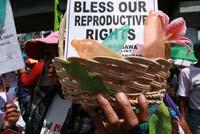Population control plan panned as culture of death

Benigno Aquino III, the newly minted president of the Philippines is heading for a showdown with the nation’s powerful Catholic Church over the distribution of condoms to curb a runaway population.
The Church, this week, while trying to avoid a confrontation said it prefers to open "a dialogue" but that excommunicating the coutnry’s president remains "a possibility"
"That is a possibility, but I don’t see right now that it is a proximate possibility," said Bishop Nereo Odchimar, the head of the Phillippines’ Catholic bishops.
The bishop went on to say, "We will exhaust all means before coming to a point of confrontation."
The debate on Reproductive Health has been running for years the the predominately Catholic Philippines.
The law rejects clinical abortions, but promotes a family planning program, which prevents couples from having more than two children and encourages voluntary sterilization. Those who fail to comply with the law are likely to face a fine and imprisonment in some cases.
The Catholic Church instead promotes the Natural Family Programme (NFP), which aims to spread a culture of responsibility and love based on Christian values among the population.
To date, the Aquino government considers the NFP ineffective in stopping the high birth rate and accuses the Church of undue interference in matters which concern the civil authority.
In 2009, Pope Benedict XVI sparked controversy in 2009 by insisting that condoms should not be distributed in Africa as a means of fighting AIDS. The pontiff told the media that condom distribution in AIDS-stricken countries only serves to "aggravate" the epidemic.
The views in the Canadian-Filipino community were mixed over the battle between the Church and the State.
“We have religion..without religion..we have nothing..we must follow the teachings of the Catholic Church not the elected leaders…if our faith is strong, God will know how to look after the problems in the Philippines,” said Leslie Letina, a migrant worker in Vancouver.
Agnes King, however said the Church in the Philippines is out of touch with what the nation needs.
“Would the church prefer to see young Filipino women go thru the horrors of illegal abortion..The church stands for human rights..except in this case,” said the caregiver in Surrey.
Artificial birth control is often taboo in this staunchly Roman Catholic country. Yet with a birth rate that is one of the highest in the world, sustainable population growth is becoming a burning issue, especially as millions of poor people struggle to feed themselves at a time of high food prices.
This year’s global food crisis, which saw prices of basic commodities such as rice soar beyond the reach of millions of poor people, created shock waves in the Philippines where more than 40 per cent of the population live on $2 or less a day.
Spooked by a precarious political and economic situation, some lawmakers are trying to pass a bill that will compel the central government to promote artificial family planning rather than solely focus on natural birth control methods supported by the Church.
Twenty-seven economists, including four former economic planning secretaries and one former budget secretary, have signed a paper supporting the bill.
The Church has denounced the bill as "morally unacceptable" and warned politicians, particularly senators that their stance will be remembered come election time.
"The Catholic Church knows how to mobilize its members not to vote for anti-life politicians," warned Father Melvin Castro of the Catholic Bishops Conference of the Philippines.
Nearly half of the estimated 3.1 million pregnancies that occur every year in this Southeast Asian country are unplanned. Around half a million end in illegal and often dangerous back-street abortions.
While a relatively small middle class in the Philippines can easily afford contraceptives, millions of poor women cannot. A month’s supply of the pill costs 39 pesos or around $0.91, around half the average daily salary of almost half the population.
That is why President Aquino is supporting the free distribution of condoms and touched off this round of reproductive rhetoric.
Earlier this month, Aquino reached out to Church leaders during which he explained his position on responsible parenthood
A Church official, who requested anonymity, described the meeting as merely a “friendly, courtesy” visit preparatory to a dialogue.
Those cordial talks gave way to heightened rhetoric and threats of excommunication again this week after some strong words by a powerful prelate.
The head of the Catholic Episcopal Commission on Family and Life, Fr. Melvin Castro, condemned the Phillippine government’s plan to provide condoms to couples upon request as a manifestation of "the culture of death," LifeSiteNews reported.
"We are not accusing anyone," said Castro. "We respect the leaders of our government, that’s why we pray for them. But what the poor need are jobs and education opportunities, not artificial contraceptives." Castro added, "We are not fighting the government. What we are opposed to is a culture, a lifestyle--the culture of death."






